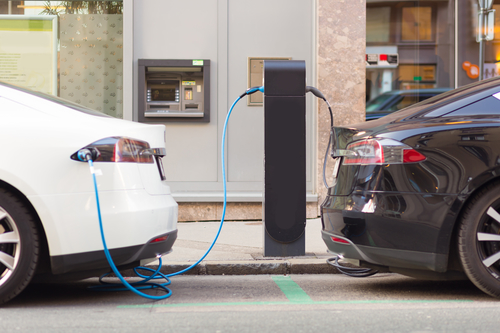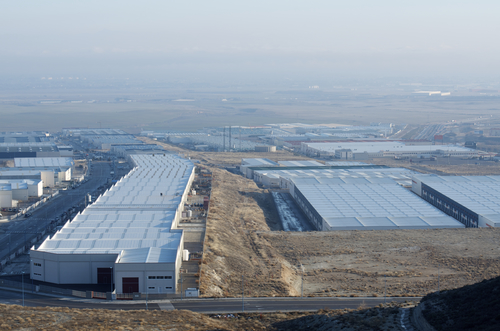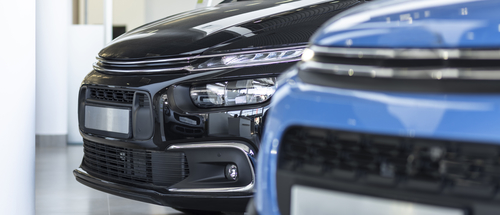Renault announces cooperation with Jianglin Motor Electric Vehicles
In mid-July, the French car manufacturer Renault invested 145 million US dollars in a 50 percent stake in Jianglin Motor Electric Vehicles. The subsidiary of Jianglin Motor sold around 500,000 electric vehicles in 2018, making it one of the leading manufacturers in China. Sales of electric vehicles have increased rapidly in China after the government introduced subsidies and tax breaks. By switching to electric drives, the country wants to reduce pollution and promote the local automotive industry. In 2018, according to the Chinese Automobile Manufacturers Association, 1.26 million vehicles with alternative drives (electric and hybrid) were sold, an increase of 62 percent over the previous year.
China is already the world’s largest market for electric vehicles and the aim is to increase sales of alternative drive vehicles to 7 million units per year by 2025. The government plans to gradually reduce subsidies and tax breaks, while many major cities want to ban cars with old gasoline and diesel engines.

The collaboration with Jianglin Motor is Renault’s fourth partnership in China. It began in 2013 with Dongfeng Motor and the founding of Dongfeng Renault Automobile Company, which produces Renault branded vehicles in China. In August 2017, Renault, together with its global alliance partner Nissan, established a joint venture with Dongfeng, eGT New Energy Automotive. Just one year later, Renault announces its collaboration with Brilliance Auto for the production of light commercial vehicles. Renault’s ambitious target is to sell 550,000 vehicles annually in China by 2020, which would double the 2018 sales figure to around 217,000 vehicles. The Chinese market therefore remains attractive to car manufacturers and suppliers wishing to export their products to China. This requires the mandatory China Compulsory Certification (CCC), for which we are happy to advise you.
For more information on how CCC certification may affect your company, or for more information about CCC certification in general, the process, and the associated costs, please visit our website and our News Section where you will find current updates twice a week.
Please do not hesitate to contact us for further details and consultation. You can contact us via e-mail, or call us (UK: +44 2071931135, Rest of Europe: +49 69 2713769150, US: +1 773 654-2673).
You can also check out our free CCC-Brochure, which can be downloaded right here as a PDF file or you consult our book (in English) “A Brief Guide to CCC: China Compulsory Certification”, which can be found directly hier on Amazon.
Video about India BIS Certification
The process of certification in India can be confusing and frustrating to figure out. Manufacturers usually assign their quality engineers or officers with the daunting task of getting their products certified. Unfortunately, there are many different authorities and testing labs for different product groups, and often opinions among different labs differ. Added to that the lack of up-to-date information on government websites can make the certification process seem overwhelming.
MPR China Certification GmbH / China Certification Corporation released a video which clearly illustrates the process of the Indian BIS certification, breaking it down to manageable steps.
The two-minute video gives a broad over-view of the necessary steps involved in getting
BIS certification. The video points out specific areas of importance including application preparation, need for test samples to be sent and cleared through customs in India, and the importance of consistency between the application, test reports, certificate and product marking.
Here’s a brief video introduction of the AIS certification, presented by Julian Busch, director of MPR China Certification GmbH / China Certification Corporation:
https://www.youtube.com/embed/fhM5yABxQfY
You can also watch this video in our Youtube Channel.
If you have any questions regarding any aspect of BIS Certification, please don’t hesitate to contact us. We can discuss your specific concerns and offer personalized solutions. Contact us by phone (UK: +44 2071931135, Europe: +49-69-2713769150, US: +1 773 654-2673) or email us with any questions you may have.
Changes to the Mandatory Certification Catalogue for Fire Protection Products
The highest-ranking certification authority in China, the State Administration for Market Regulation (SAMR) has announced a major change to the scope of fire protection products that require mandatory certification (CCCF certification).

Starting from August 1, 2019, fire protection products from 13 categories do not require mandatory certification anymore. However, manufacturers of all of these products can now apply for voluntary certification.
For companies with products that have been certified under mandatory certification in the past there are two options. They accept that their certificates will be cancelled by the authority or they can convert their certificates into voluntary certificates.
Regarding the new processes under voluntary certification, the authority has emphasized that the general certification procedure is consistent with the previous mandatory certification processes. This is also reflected in the newly published implementation rules, which have largely remained unchanged as well
With the elimination of compulsory certification for 13 product categories, there are still three product categories that require mandatory certification.
Some products that are still required to be certified under mandatory certification are:
- Fire extinguishers
- Fire detectors (e.g. smoke detectors and flame detectors)
- Fire alarm devices
- Emergency lighting products
- Fire safety signs
- Fire escape products (e.g. escape ladders or chutes)
- Respiratory protective devices for self-rescue
If you are unsure about the procedure of converting your certificates to voluntary or whether your products now fall under voluntary certification, please do not hesitate to contact us. We can support you answering your questions and going through the necessary processes with the authority. Additionally, we can provide translations of relevant standards and Implementation Rules.
Send us an email or call us and we will be pleased to assist you.
UK: +44 2071931135, Europe: +49-69-2713769150, US: +1 773 654-2673
The first Chinese-made electric vehicle launches in Europe
Chinese automobile manufacturers have tried several times to market vehicles outside their home country. While there has been little success in Southeast Asia and Africa, these projects have so far failed in established markets such as the USA and Europe. Now Aiways, a Shanghai-based start-up company, is trying again with its flagship U5. The four-year-old company wants to offer its vehicle in Germany, France, Switzerland, Norway and the Netherlands from spring 2019. This would make the Aiways U5 the first electric vehicle produced in China on the European market.

The company’s strategy is to bypass traditional sales channels such as dealers and offer the vehicle directly to customers in online sales and leasing. “This could reduce costs and compete with conventional cars,” said Alexander Klose, Vice Chairman Foreign Business affairs. The price of the U5 is expected to be less than 40,000 euros and may be offered via the German Leasing-Startup Vehiculum.
However, Aiways ambitious plans for the market launch could be delayed by regulations and approvals. Only recently, the company received a license for the production of vehicles and is working together with the Chinese manufacturer Jiangling Motors for series production. The U5 will then be available on the domestic market from September, only 8 months before the planned launch in Europe, which has different safety standards. Despite a good mood in the Chinese automotive industry, in 2018 the country exported only 2 percent of its total production or the equivalent of 760.00 cars in figures. The industry is hoping to gain a foothold in foreign markets, especially with electric vehicles, because after a slight decline in sales figures for conventional vehicles, electric vehicles have continued to grow. In addition, against the background of the ongoing trade dispute between China and the USA, Europe appears to be an attractive market for exports of vehicles “Made in China”. Do you want to benefit from the growth in the electric vehicle segment and export your products to China? You need the obligatory China Compulsory Certification (CCC), for which we will be happy to advise you.
For more information on how CCC certification may affect your company, or for more information about CCC certification in general, the process, and the associated costs, please visit our website and our News Section where you will find current updates twice a week.
Please do not hesitate to contact us for further details and consultation. You can contact us via e-mail, or call us (UK: +44 2071931135, Rest of Europe: +49 69 2713769150, US: +1 773 654-2673).
You can also check out our free CCC-Brochure, which can be downloaded right here as a PDF file or you consult our book (in English) “A Brief Guide to CCC: China Compulsory Certification”, which can be found directly here on Amazon.
China builts new cities exclusively for the production of electric vehicles
One of these new cities, designed from the scratch, is the Shunde New Energy Vehicle Town near Foshan, the industrial center of southern China. According to the local government, the planned center for the development and production of electric vehicles will generate 15 billion US dollars in revenues for the city administration. In addition to Shunde, China is planning at least 20 other cities geared to electric vehicles, modelled on Detroit in the USA or Wolfsburg in Germany. Chinese President Xi Jinping calls on the 500 leading electric vehicle manufacturers to establish a self-sufficient supplier industry in order to become less dependent on foreign companies or exports. One of the reasons is probably also the continuing and increasingly intensifying trade dispute between the USA and China.
The strategy to create these new cities is based on two pillars. On the one hand, the central government promotes the development of infrastructure with direct investments totalling 30 billion US dollars; on the other hand, the city administrations offer potential investors cheap land, tax advantages and housing for the workers in the hope of locating car manufacturers, suppliers and research institutions. “A successful electric vehicle manufacturer will bring at least another 200 companies from its supply chain into the new environment,” said He Xiaopeng, chairman of an electric car startup funded by Internet giant Alibaba and Taiwan’s Foxconn Group. “No local municipality can afford to fail to attract this new industry.“

In order to find sufficient buyers for the electric vehicles produced, China subsidized their sale with 36.5 billion US dollars between 2009 and 2017. The calculation seems to work out, the country currently accounts for half of all electric vehicles sold worldwide. Nevertheless, measured by the total annual sales of new vehicles in China, electric cars account for only five percent. In addition, the mood in the Chinese automotive industry is falling with declining sales figures and a certain reluctance on the part of customers to buy a new car. And the government is also gradually cutting back subsidies in line with the slogan “innovation instead of mass production”. This is precisely where foreign know-how could boost development, at least temporarily. This is because numerous automobile manufacturers in China import components from abroad. Are you active in the automotive sector and want to sell on the Chinese market? We will be happy to advise you on the China Compulsory Certification (CCC) that is obligatory.
For more information on how CCC certification may affect your company, or for more information about CCC certification in general, the process, and the associated costs, please visit our website and our News Section where you will find current updates twice a week.
Please do not hesitate to contact us for further details and consultation. You can contact us via e-mail, or call us (UK: +44 2071931135, Rest of Europe: +49 69 2713769150, US: +1 773 654-2673).
You can also check out our free CCC-Brochure, which can be downloaded right here as a PDF file or you consult our book (in English) “A Brief Guide to CCC: China Compulsory Certification”, which can be found directly hier on Amazon.
Volkswagen invests one billion euros in India for subsidiary Skoda

At a press conference in New Delhi on July 2, 2018, Skoda CEO Bernhard Maier and Skoda Auto India Managing Director Gurpratap Boparai announced further details. The Volkswagen Group will invest one billion euros in the project between 2019 and 2021 through its subsidiary Skoda. This sum is one of the largest investments in the Indian automotive sector and at the same time the starting signal for a model offensive of the Skoda brand in India. To ensure that the new models meet the requirements of the Indian market, Skoda will set up a local development centre and design and produce the new vehicles in India. The existing Volkswagen Group platform MQB will be used for this purpose, which already complies with the stricter safety and emission guidelines that will come into force in India from 2020.
Skoda CEO Bernhard Maier justified the investment with the fact that India will be the world’s third-largest automobile market in the coming years and, together with the Volkswagen brand, he expects the Group to have a market share of around five percent. According to Boparai, Managing Director of Skoda Auto India, Skoda and Volkswagen are in a good position to penetrate the Indian automotive market. It is possible to sell first-class products at reasonable prices and also benefit from the awareness of the Volkswagen brand and the appreciation of German engineering. By adapting the MQB A0 platform to Indian conditions, a rapid development of new vehicle models is possible, which will later be exported to other countries. The first model to be sold on the Indian market from 2020 will be a mid-size SUV.
As part of the “India 2.0” project, up to 5,000 new jobs will gradually be created in the new development centre and production facilities. Skoda currently offers four vehicle models on the Indian market, including the KODIAQ, which was launched in October 2017. Skoda operates plants in Pune and Aurangabad, where it also has its headquarters. The vehicles are sold by 70 dealers and a further 70 service centers in the country. Skoda Auto has been present on the Indian market since 2001. The automotive sector in India can also be an opportunity for growth and globalisation for your company. The export of products to India often requires an obligatory India certification according to the Automotive Industry Standard (AIS). We would be pleased to advise you comprehensively on the AIS certification for India.
Kia Motors builds new production facility in India
An agreement between Kia Motors and the government of Andhra Pradesh on the construction of the new plant was signed in April 2017. Construction work on the new facility began in late 2017 and marks Kia Motors’ first investment in India with a total value of $1.1 billion. Production is scheduled to start in the second half of 2019 and annual capacity is expected to reach 300,000 units. The plant site covers an area of approximately 2 square kilometers and has facilities for stamping, welding, painting and assembly. There are also numerous Kia suppliers on the site. In the new plant, Kia is building two new models, a sedan and a compact SUV, both exclusively for the Indian market.
According to Kia Motors Chairman Han-Woo Park, the Andhra Pradesh plant is the company’s most modern and advanced. “By opening up the Indian market, currently the fifth largest in the world, we can consistently pursue our global strategy as an international automaker,” Park continued.
The new plant in Anantapur will enable Kia to sell its models in India and benefit from market growth. The company plans to launch sales at the end of 2019, once series production begins. Kia justifies its location decision for Anantapur with the existing network of suppliers and the good availability of qualified employees. India is the fastest growing automotive market with more than 3.3 million new vehicles sold in 2016 and number five worldwide. Forecasts predict that by the end of 2020 India will be the world’s third largest automotive market after China and the USA.
New Guidelines for Wireless Products in China
In China wireless products fall under the State Radio Regulation of China (SRRC) issued by the Ministry of Industry and Information Technology (MIIT). Producers of wireless products are required to have their products tested and certified under the SRRC scheme.

According to the recent SRRC announcement, SRRC certified products (including SRRC approved modules, excluding short-range micro power devices), must follow a sales reporting process backdated to March 1, 2019. Which means the selling entity (be it the manufacturer, the reseller, or the importer) needs to register with the MIIT via a web portal within 10 business days of shipment to the end-customer. What’s important here: the registering entity needs to be located within China. If the selling entity is not in China, for example if the OEM sells directly to its end-customers, then a local representative within China will need to be arranged (similar to the initial certification process). If an OEM has several resellers, each individual reseller will need to register separately with the MIIT.
Upon registration the registering entity will be issued a registration number and a QR code by MIIT. The QR code is for end-customers to check for product and certification information. The registration number and QR code must be displayed at the location of where the product is being sold, whether that’s a store or on a website. In other cases they need to be kept on file.
If this process is not finished and registration not obtained by the selling entity, they can receive a fine of up to $5,000 USD by the MIIT, but the certified manufacturer might also lose their certification.
If you are interested in the SRRC Type Approval for telecommunication equipment, please do not hesitate to contact us.
- We will provide you with a non-binding check to see if your product(s) need an SRRC Type Approval.
- We will provide you with a non-binding, transparent, all-inclusive quotation stating the costs and time needed to get the SRRC Type Approval.
If you decide to use our services:
- We will take over all communications with the Chinese test lab and certification authorities. In case that product tests and a factory inspection by MIIT are needed, we take over all the necessary steps.
- We will pay all application and testing fees needed at the Chinese authorities.
- We will do everything to ensure you a smooth and quick SRRC Type Approval
We are here to help even if you just have questions regarding the SRRC Type Approval or Network Access License (NAL). Send us an Email or call us:
UK: +44 2071931135 email: info@china-certification.com
Europe: +49 69 2713769150 email: info@china-certification.com
US: +1 773 654-2673 email: usa@china-certification.com
It would be a pleasure to support you.
Citroën targets the Indian market
The announcement was made during a press conference in Chennai, southern India, attended by Citroën CEO Linda Jackson and other top managers. Citroën hopes to increase its international presence by positioning itself in the Indian automotive market. The same procedures that have been successful in Europe over the last five years will be applied. There, a continuous growth with gains in market share could be recorded. This strategy includes vehicles with a distinctive design and high user comfort, excellent customer service and attractive pricing. One of the ways to achieve this is through strong local integration based on the two existing joint ventures between the PSA Group and the CK Birla Group. The joint ventures are active in the sales and assembly of vehicles as well as in the manufacturing of powertrains.

In order to survive in the Indian market, Citroën plans to develop and introduce new vehicle models, initially tailored to local needs. At a later stage, however, exports to other countries are also planned. However, as these vehicles will not be ready for the market until 2021 at the earliest, Citroën will start its offensive in India with the flagship model C5 Aircross SUV as early as 2020.
With 1.3 billion inhabitants, India is the country with the second highest population worldwide and will soon overtake China as number one. It also has the average youngest population of 25 years and, based on current growth, experts expect India to become the leading economic power in a few years’ time. India also has excellent potential for the automotive industry. Currently, only 40 per 1000 inhabitants own a car and the population of the middle class will grow by 75 percent or, expressed in figures, from 63 million to 110 million by 2025. The market for passenger cars is expected to grow by 8 percent annually from 3.3 million units to over 6 million in 2025, making India the third largest automotive market after China and the US by 2020. You too can benefit from the growth in India. For the export of vehicles and components, you need an obligatory India certification according to the Automotive Industry Standard (AIS). We will be happy to provide you with comprehensive advice on AIS certification for India.



